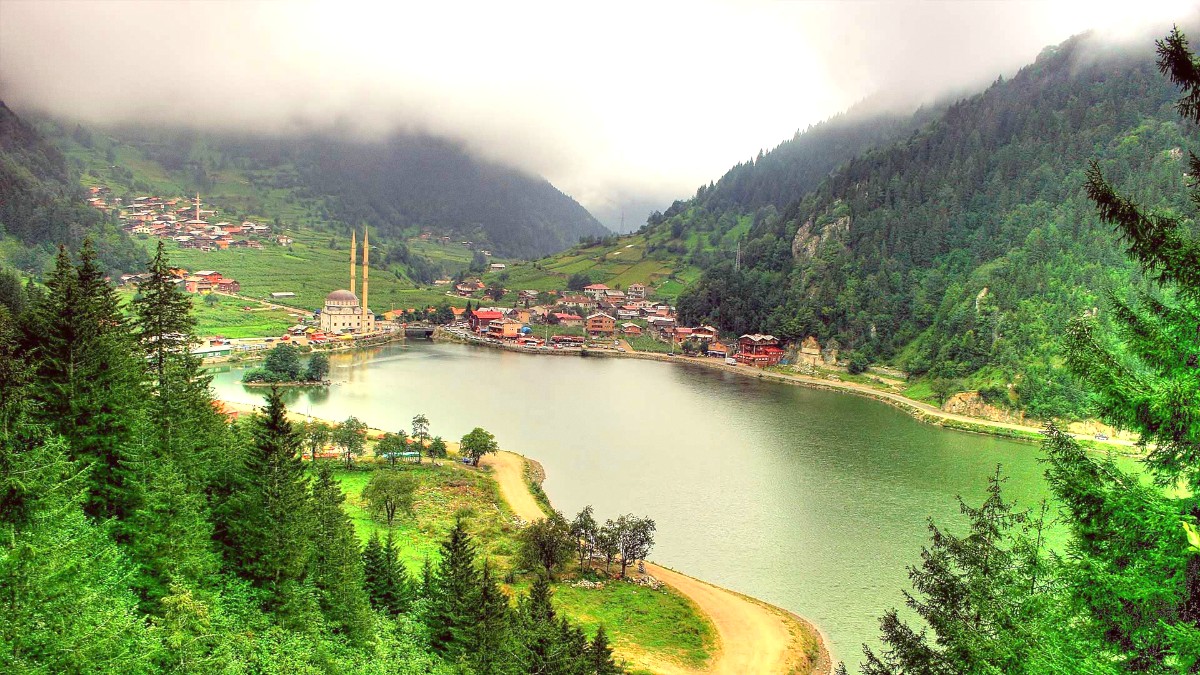
The Black Sea And Northeastern Anatolia, Turkey
Trabzon's food stands heavily influenced by its Black Sea coast position and mountainous hinterland. The region is known for rich fishing grounds, especially for anchovies (hamsi), and abundant corn production. Dairy farming also dominates, leading to widespread use of local butter and cheeses.
The cuisine is hearty, fresh, and relies on locally sourced, natural ingredients. Unlike some other Turkish regions, it often contains fewer spices, focusing instead on the inherent flavors of its fresh components.
The most iconic ingredient. Prepared fried, baked, mixed with rice, or into bread. Corn/cornmeal (Mısır) is a staple, used for mısır ekmeği and kuymak.
Traditional Black Sea butter (tereyağı) offers rich flavor. Kolot peyniri (stringy, melting cheese) forms an integral part of dishes. Black cabbage (kara lahana) appears in robust soups and wraps.
Tea (Çay) is omnipresent as the region is Turkey's main producer. Hazelnuts (Fındık) appear in desserts and snacks. Cuisine is rich, savory, with a slight tang; fresh herbs like parsley and dill are common, hot spices less so.
Small anchovies, often lightly floured with cornmeal and pan-fried until crispy. A true regional specialty, especially in autumn and winter when fresh anchovies are abundant.
Order "hamsi tava" with "mısır ekmeği" (cornbread) for a complete, authentic Black Sea meal.
A hearty, gooey fondue-like dish made with cornmeal, cheese (specifically Kolot peyniri), and copious amounts of butter. It is best eaten hot, directly from the pot, with fresh bread.
A must for breakfast or as a rich side dish.
Meatballs originating from Akçaabat. These are made from minced beef with specific local spices, grilled to perfection. Served with grilled peppers and tomatoes.
Seek out specialty köfte restaurants in Akçaabat or Trabzon.
Çay, the most consumed beverage, signals Turkish hospitality. Ayran, a salty yogurt drink, matches savory meals.
Şalgam Suyu, a tangy fermented black carrot drink. Turkish Coffee is strong and unfiltered. Raki, an anise-flavored alcoholic drink, is a common choice.
Dedicated "fine dining" restaurants, as understood in Western cities, stand few. Yet, upscale hotel restaurants (e.g., at Zorlu Grand Hotel) deliver a more refined dining experience, often with international and high-quality Turkish cuisine.
Numerous options deliver traditional Turkish and Black Sea cuisine. These often appear around the city center (Meydan Parkı) and along the coastal road, delivering comfortable settings and varied menus.
Trabzon Bedesten, a historic covered bazaar, offers local products. Local markets (Pazar) deliver fresh produce and regional goods. Trabzon Forum AVM contains a food court with Turkish and international fast food.
Vegetarian options are relatively simple to find, with many vegetable-based dishes. Vegan choices pose more challenge, as dairy and meat are widely present. Ask about butter, yogurt, or cheese.
Focus on salads (without cheese), certain vegetable stews (without meat or butter), bread, and fresh fruit.
Halal meat is standard in Turkey. Kosher availability is extremely limited. Gluten-free presents challenge due to prevalent wheat. For severe allergies, a translation card detailing your specific allergy is helpful.
Learn Turkish phrases for dietary needs. Use a translation app for clear communication. A 'translation card' for allergies is a good tool.
Less formally organized; inquire with local operators.
Visit tea plantations or hazelnut orchards during harvest.
Local festivals like the "Hamsi Festival" occur seasonally.
Dine in a traditional yayla house for rustic charm.
Local hazelnuts, dried fruits, and nuts are popular snacks. Grab them from local vendors or markets.
Excellent for a quick energy boost or as a gift.
Sütlaç, often baked with a caramelized top, makes a comforting dessert. Baklava, with its layers of phyllo pastry, nuts, and syrup, features regional variations.
Savor these traditional sweets after a meal or with tea.
Formal food tours or cooking classes appear less common. Inquire with local agencies upon arrival for bespoke food experiences or visits to tea plantations in Rize, a short drive away.
Dining in a traditional yayla house (highland bungalow) in Uzungöl or Ayder delivers an unique culinary experience alongside stunning natural surroundings. Taste regional dishes prepared with local ingredients in a rustic setting.
Opportunities for baking workshops, especially for local bread or pastries, may exist. These are typically less formal, so inquiring locally upon arrival for informal classes is the best approach.
Visit active tea plantations in nearby Rize for a deep dive into Turkey's tea production. This activity includes insights into harvesting and processing.
Experience hazelnut harvest season in late summer. This activity connects you directly with local agriculture and the source of a regional product.
This festival occurs in winter, subject to a good anchovy catch. It presents a chance to taste various anchovy dishes and experience local festivities celebrating the region's most iconic fish.
A significant cultural and culinary event, drawing local participation.
Trabzon hosts local festivals centered around agricultural products like tea and hazelnuts. These events typically focus on the local community, offering authentic cultural insights and food experiences not always geared towards major tourism.
Check local calendars or with accommodations for current schedules.
Taste regional dishes prepared with local ingredients in a rustic setting, away from urban bustle.
Dine at eateries dedicated to Trabzon Pidesi, offering various fresh, hot flatbreads.
Visit dedicated restaurants for the unique meatballs from Akçaabat, served with local sides.
Engage with locals, try street food, and visit markets for the freshest flavors. Dining in Trabzon is a truly local experience.